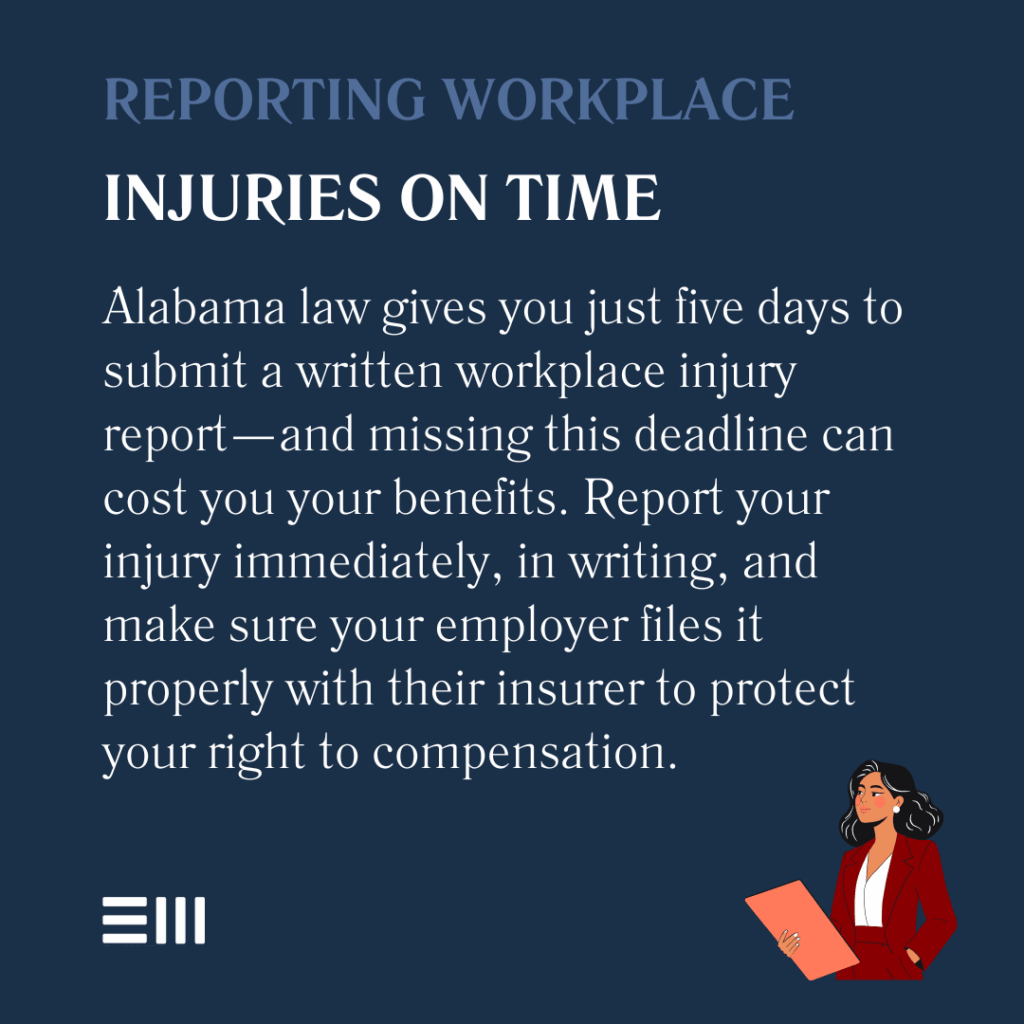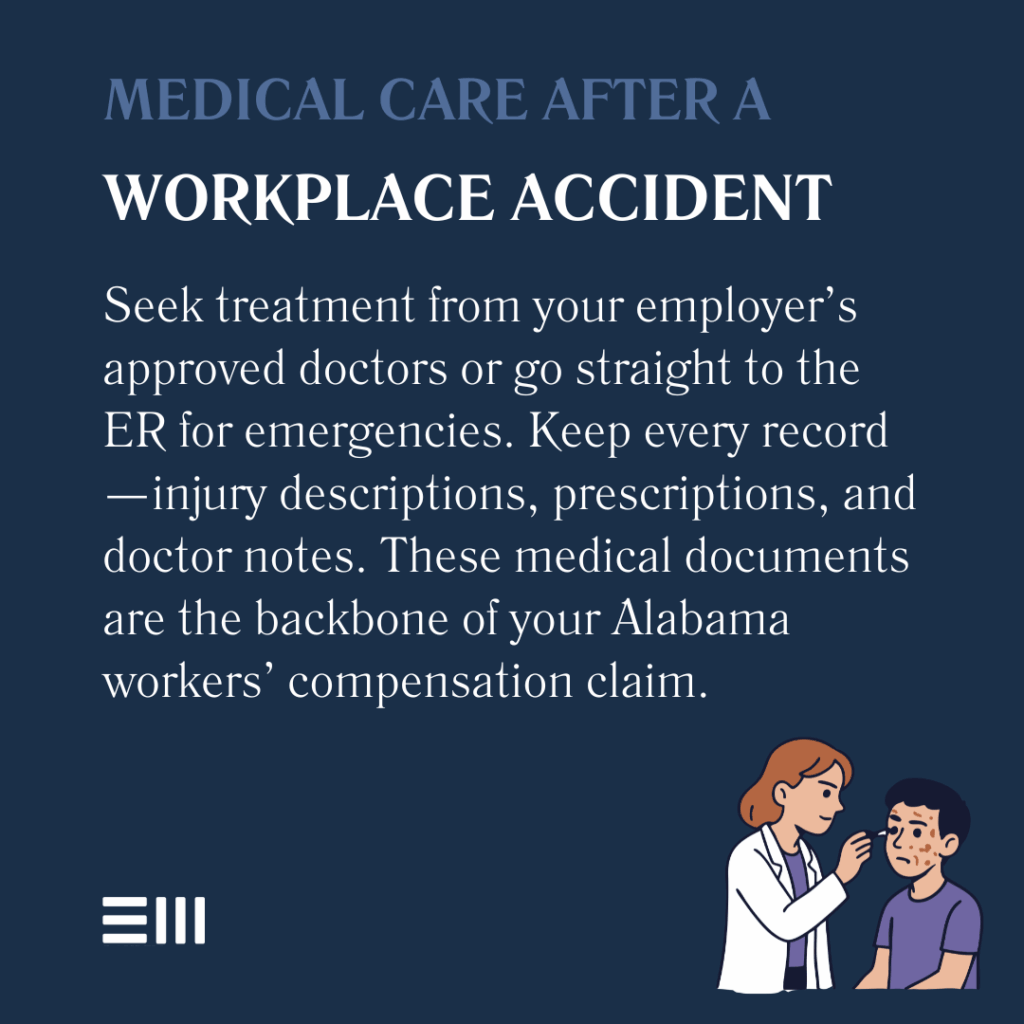
The warehouse clock reads 2:47 PM when metal scaffolding collapses, sending a construction worker plummeting fifteen feet onto concrete. In the chaos that follows, every decision made in the next few hours will determine whether he receives full compensation or loses his rights entirely.
Workplace injuries strike without warning, leaving workers confused, in pain, and unsure how to protect themselves legally.
Knowing the precise steps to take if you’re injured at work transforms a potential disaster into a manageable situation where your medical needs, financial security, and legal rights remain protected throughout Alabama’s complex workers’ compensation system.
Immediate Actions Following a Workplace Injury
The moments immediately after a workplace accident require swift, decisive action to protect both your health and legal rights.
Taking proper steps during this critical period establishes the foundation for your entire workers’ compensation claim.
- Assess your condition: Determine if you need emergency medical attention or can move safely.
- Alert nearby coworkers: Get immediate help and ensure witnesses observe your condition.
- Report to supervisor: Notify management immediately, regardless of injury severity.
- Document the scene: Take photos of hazards, equipment, and injury location if possible.
- Identify witnesses: Record names and contact information of anyone who saw the accident.
- Refuse unsafe work: Don’t return to dangerous conditions that caused your injury.
These initial steps to take if you’re injured at work create crucial evidence while ensuring your immediate safety and establishing the official record of your workplace accident.

Medical Treatment Protocols
Securing appropriate medical care while following Alabama’s workers’ compensation rules requires understanding your rights and employer obligations.
Proper medical documentation becomes the cornerstone of successful claims.
#1: Emergency vs. Non-Emergency Care
Different injury severities require different approaches to seeking medical treatment under Alabama law.
- Emergency situations: Go directly to nearest emergency room for life-threatening injuries.
- Urgent injuries: Visit authorized urgent care facilities on employer’s approved list.
- Panel physicians: Choose from employer’s four-doctor panel for ongoing treatment.
- Follow-up care: Schedule appointments with authorized doctors within 24-48 hours.
- Specialist referrals: Obtain referrals through a panel physician for specialized treatment.
Understanding these medical treatment pathways ensures you receive proper care while maintaining your eligibility for workers’ compensation benefits.
#2: Medical Documentation Requirements
Thorough medical documentation provides the evidence necessary to support your workers’ compensation claim.
- Detailed injury description: Ensure doctors document how the workplace accident caused injuries.
- Work restrictions: Obtain written limitations on physical activities and job duties.
- Treatment plans: Request comprehensive outlines of required medical care.
- Progress notes: Keep copies of all medical reports and physician observations.
- Medication records: Document all prescriptions related to workplace injury.
Complete medical records form the foundation for determining appropriate benefits and compensation levels.

Reporting Requirements and Deadlines
Alabama law establishes strict deadlines for reporting workplace injuries, making timely notification one of the most critical steps to take if you’re injured at work.
Missing these deadlines can forfeit your right to benefits.
- Immediate verbal notice: Report injury to supervisor before leaving work when possible.
- Five-day written notice: Submit written injury report within five days of accident.
- 90-day formal notice: File formal notice for cumulative trauma or occupational diseases.
- Two-year statute: File workers’ compensation claim within two years of injury.
- Employer reporting: Ensure employer files First Report of Injury with insurer.
Strict compliance with reporting deadlines preserves your rights and prevents technical claim denials based on late notification.
Preserving Evidence for Your Claim
Building a strong workers’ compensation case requires systematic evidence collection from the moment of injury.
Proper documentation often determines the difference between claim approval and denial.
- Photograph everything: Capture injuries, accident scene, equipment, and safety hazards.
- Preserve physical evidence: Keep damaged equipment, torn clothing, or broken safety gear.
- Written accident account: Create detailed narrative while memory remains fresh.
- Witness statements: Obtain written accounts from coworkers who observed accident.
- Video surveillance: Request copies of workplace security footage immediately.
- Safety records: Document any prior complaints about dangerous conditions.
Comprehensive evidence collection strengthens your position during negotiations and helps overcome employer or insurance company challenges.
Understanding potential compensation values helps set realistic expectations.
Navigating the Claims Process
Understanding procedural steps to take if you’re injured at work helps avoid common pitfalls that delay or reduce benefits. Each phase requires attention to detail and proper documentation.
- Complete employer forms: Fill out all required accident and injury report documents.
- Authorize medical releases: Sign forms allowing insurers to obtain treatment records.
- Attend medical appointments: Never miss scheduled treatments or evaluations.
- Communicate carefully: Provide factual information without exaggerating or minimizing.
- Track expenses: Document all costs related to injury including mileage and medications.
- Follow restrictions: Strictly adhere to doctor-ordered work and activity limitations.
Careful navigation through each claim phase maximizes your chances of receiving full benefits while avoiding actions that could jeopardize your case.
For additional guidance, review our comprehensive personal injury claim guide.
Frequently Asked Questions About Workplace Injuries in Alabama
Workers facing on-the-job injuries often have urgent questions about their rights and the steps to take if you’re injured at work in Alabama.
Should I Give a Recorded Statement to Insurance?
Insurance adjusters often request recorded statements immediately after workplace injuries, but you’re not required to provide one without legal counsel.
These statements can be used against you later to minimize or deny claims. Politely decline and consult an attorney before discussing your injury with insurance representatives.
Written reports to your employer fulfill legal requirements without risking misstatements. Learn about average settlement values to understand what fair compensation looks like.
Can My Employer Fire Me for Filing a Workers’ Comp Claim?
Alabama law prohibits employers from retaliating against employees who file legitimate workers’ compensation claims.
Termination, demotion, or harassment after reporting workplace injuries may constitute illegal retaliation.
Document any adverse employment actions following your injury report. While at-will employment rules still apply, timing and circumstances of termination matter significantly in proving retaliation.
What If My Employer Says to Use My Health Insurance?
Employers sometimes pressure injured workers to use personal health insurance instead of filing workers’ compensation claims, but this violates Alabama law.
Workers’ compensation should cover all work-related injuries without copays or deductibles. Using personal insurance can complicate your claim and result in improper denials later.
Insist on proper workers’ compensation coverage for workplace injuries. For detailed comparisons, see our guide on workers’ compensation vs. personal injury claims.
When Should I Return to Work After an Injury?
Return to work only when your authorized treating physician provides written clearance with specific restrictions if applicable. Returning too early risks re-injury and can damage your claim if complications arise.
Light duty work must accommodate all medical restrictions. Never let employer pressure override medical advice about your recovery timeline and work capabilities.
Understanding typical case timelines helps manage expectations during recovery.
Let Justice Roll
Taking the right steps to take if you’re injured at work protects your health, income, and future—but navigating Alabama’s workers’ compensation system alone leaves you vulnerable to costly mistakes.
Our experienced workers’ compensation attorneys here at Baxley Maniscalco understand the tactics insurance companies use to minimize claims and the pressure employers apply to discourage legitimate benefits.
We guide injured workers through every phase of the claims process, from initial reporting through final settlement, ensuring maximum compensation for your injuries. Don’t let confusion about procedures or fear of retaliation prevent you from securing the benefits you deserve.
Contact us today for a free consultation to review your workplace injury and discover how we protect Alabama workers’ rights with aggressive advocacy and compassionate support.
Can't find what you're looking for? Search our site below.










